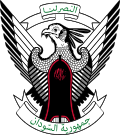
Back جمهورية السودان الديمقراطية Arabic Súdánská demokratická republika Czech República Democrática de Sudán Spanish Sudaani Demokraatlik Vabariik Estonian スーダン民主共和国 Japanese República Democrática do Sudão Portuguese Демократическая Республика Судан Russian สาธารณรัฐประชาธิปไตยซูดาน Thai Sudan Demokratik Cumhuriyeti Turkish جمہوری جمہوریہ سوڈان Urdu
This article has multiple issues. Please help improve it or discuss these issues on the talk page. (Learn how and when to remove these template messages)
|
Democratic Republic of the Sudan | |||||||||
|---|---|---|---|---|---|---|---|---|---|
| 1969–1985[1] | |||||||||
| Motto: النصر لنا "Victory is ours" | |||||||||
| Anthem: نحن جند الله، جند الوطن (Arabic) Naḥnu Jund Allah, Jund Al-waṭan (English: "We are the Soldiers of God, the Soldiers of the Nation") | |||||||||
 | |||||||||
| Capital | Khartoum | ||||||||
| Common languages | Arabic English Other languages of Sudan | ||||||||
| Religion | Islam Animism Christianity | ||||||||
| Government | Unitary one-party socialist republic under a military dictatorship | ||||||||
| President | |||||||||
• 1969–1985 | Gaafar Nimeiry | ||||||||
| Vice President | |||||||||
• 1969–1971 | Babiker Awadalla | ||||||||
• 1971–1972 | Abel Alier | ||||||||
• 1972–1976 | Mohamed Al-Baghir Ahmed | ||||||||
• 1976–1979 | Abuelgasim Mohamed Hashim | ||||||||
• 1979–1982 | Abdul Majid Hamid Khalil | ||||||||
• 1982–1985 | Omar Muhammad al-Tayib | ||||||||
| Prime minister | |||||||||
• 1969 | Babiker Awadalla | ||||||||
• 1969–1976 | Gaafar Nimeiry | ||||||||
• 1976–1977 | Rashid Bakr | ||||||||
• 1977–1985 | Gaafar Nimeiry | ||||||||
| Historical era | Cold War | ||||||||
| 25 May 1969 | |||||||||
| 6 April 1985[1] | |||||||||
| Area | |||||||||
• Total | 2,530,397 km2 (976,992 sq mi) (9th) | ||||||||
| Currency | Sudanese pound | ||||||||
| ISO 3166 code | SD | ||||||||
| |||||||||
| Today part of | Sudan South Sudan | ||||||||
| History of Sudan | ||||||||||||||||||
|---|---|---|---|---|---|---|---|---|---|---|---|---|---|---|---|---|---|---|
 | ||||||||||||||||||
| Before 1956 | ||||||||||||||||||
|
||||||||||||||||||
| Since 1955 | ||||||||||||||||||
|
||||||||||||||||||
| By region | ||||||||||||||||||
| By topic | ||||||||||||||||||
| Timeline | ||||||||||||||||||
On 25 May 1969, several young officers calling themselves the Free Officers Movement (after the Egyptian officers who instigated the Egyptian revolution of 1952) seized power in Sudan in a coup d'état and started the Nimeiry era, also called the May Regime, in the history of Sudan. At the conspiracy's core were nine officers led by Colonel Gaafar Nimeiry, who had been implicated in plots against the Abboud regime. Nimeiry's coup preempted plots by other groups, most of which involved army factions supported by the Sudanese Communist Party (SCP), Arab nationalists, or conservative religious groups. He justified the coup on the grounds that civilian politicians had paralyzed the decision-making process, had failed to deal with the country's economic and regional problems, and had left Sudan without a permanent constitution.
- ^ "The Sudan, 1985-9: The Fading Democracy Kamal Osman Salih". JSTOR. Cambridge University Press. JSTOR 160860. Retrieved 21 August 2021.
© MMXXIII Rich X Search. We shall prevail. All rights reserved. Rich X Search

